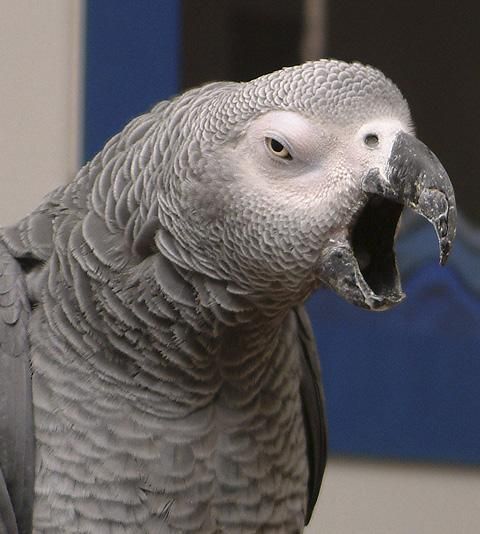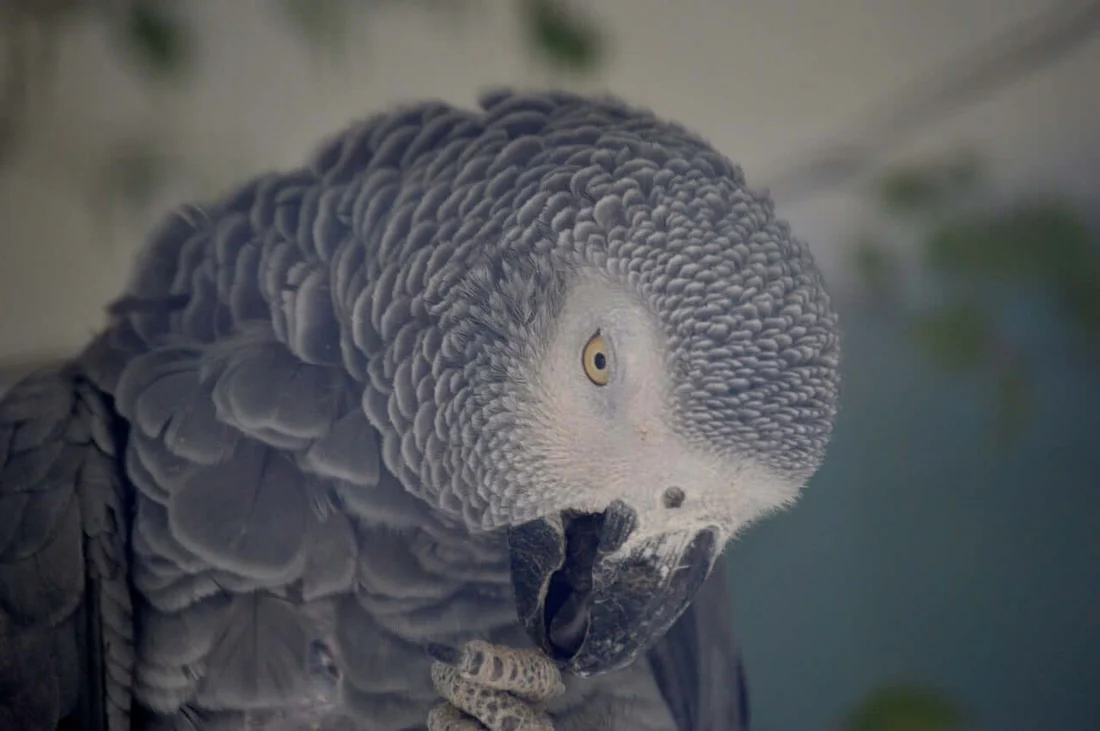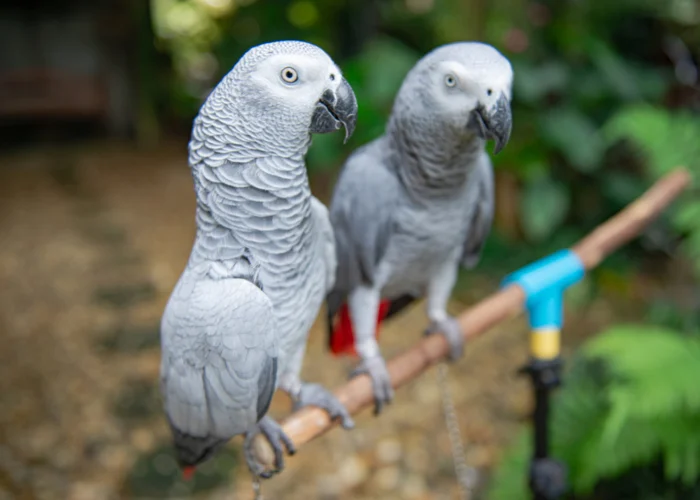Avian Articles, Blogs
Do African Grey Parrots Experience Jealousy?
Do african grey parrots get jealous, Many of us find ourselves wondering about the complex feelings of African Grey Parrots. These birds, our beloved pets, often show behaviors that make us curious. But what about jealousy? Do they feel this emotion?
African Grey Parrots can indeed feel jealous. They might become upset when visitors come over or when other pets join the family. This jealousy can lead to aggressive actions. They might scream, chase, or even bite if they feel their space is being threatened.
Several things can make an African Grey Parrot jealous. For example, bringing home a new pet, having a baby, or even a stranger visiting can upset them. Not getting enough attention, being teased, or being “sexualized” by someone in the family can also cause jealousy. Knowing why they feel jealous helps us deal with it better.
We can help manage their jealousy. Teaching them to accept others is key. The Avian Welfare Coalition suggests that the whole family should help care for the parrot. This builds strong bonds and reduces jealousy. A loving and welcoming home makes our parrots feel safe and loved.
Hormonal changes can make parrots more jealous. Taking care of their well-being helps reduce these feelings. Good sleep, a healthy diet, and a safe living space are important. Also, how we pet them matters, as wrong techniques can upset them.
Dealing with jealous African Grey Parrots needs patience and a caring approach. Instead of punishing them, we should build trust and love. Training them with methods like using a blanket and positive reinforcement with treats helps them overcome jealousy.
So, do African Grey Parrots get jealous? Yes, they do. These smart and emotional birds can feel jealous, showing in aggressive ways. But, with understanding, socializing, and training, we can have happy and healthy relationships with them.
Key Takeaways:
- African Grey Parrots can experience feelings of jealousy, particularly in the presence of visitors or other pets in the home.
- Jealous parrots may exhibit aggressive behaviors such as screaming, chasing, lunging, or biting.
- Reasons for parrot jealousy include the presence of new pets, lack of playtime or attention, arrival of a baby, introduction of a stranger, teasing, or being “sexualized” by a family member.
- It is essential to socialize and train parrots to accept other people and pets to prevent jealousy.
- Hormonal flair-ups in parrots can be minimized through proper sleep, a healthy diet, and the avoidance of nesting materials.
What Parrot Jealousy Looks Like
Jealousy in African Grey parrots shows up in many ways. They might act aggressively, like chasing or biting, when they feel threatened. They might also get loud or act out when they feel left out.
It’s important to watch for changes in your parrot’s behavior. Look for signs like being more vocal, restless, or aggressive towards certain people. These clues can tell you if your parrot is feeling jealous and what to do about it.
Many things can make a parrot jealous, like new pets coming home. Changes in the family, like a new baby or lots of visitors, can also cause jealousy. How you handle or treat your parrot can also lead to jealousy.
Figuring out why your parrot is jealous is key to fixing the problem. Make sure your parrot feels loved and cared for by everyone in the family. Give them things to do, toys to play with, and lots of attention to keep them happy and not jealous.
To deal with a jealous parrot, set clear rules and make a safe space for them. Give them toys and activities to keep their mind busy and reduce jealousy. Slowly introduce new people and things to help them get used to it.
Using training methods like a blanket with toys or clicker training can help. Introducing a doll or slowly getting your parrot used to others can also help. Remember, training takes time and patience, so be consisten.
By working on your parrot’s jealousy and creating a loving home, you can have a happy relationship with your parrot.
Reasons for Jealousy in African Grey Parrots
African Grey parrots may feel jealous for many reasons. This can really affect their feelings and actions. It’s important to know why they might feel this way to make a happy home for them.
New Pets
When new pets come home, African Grey parrots might get jealous. They might see these new animals as threats, thinking they’re taking their spot in the family’s heart.
The Arrival of a Baby
Having a new baby can make African Grey parrots jealous too. They might feel left out when the baby gets more attention. This can make them feel insecure and jealous.
Interactions with Children and Strangers
Parrots can also feel jealous when kids or strangers come over. They might see these people as intruders or ones getting more love than them. This jealousy can show in many ways, like flapping wings, hiding, or screaming.
Feeling Neglected
African Grey parrots often get jealous if they don’t get enough attention or playtime. They form strong bonds with their owners and need interaction to be happy. If they don’t get enough companionship, they might get jealous.
Mirroring Human Emotions
African Grey parrots are very aware of how humans feel. They can pick up on when their owners are sad or upset and try to make them feel better. But, this sensitivity can also make them feel jealous when they see others upset5.
Separation Anxiety
Parrots get very attached to their owners and can feel sad when they’re apart for a long time. This sadness can turn into jealousy towards new people in their owner’s life.
To keep your African Grey parrot happy and reduce jealousy, make sure they have a great home. Give them lots of social time, attention, and understand their feelings. By dealing with the reasons for their jealousy, you can have a strong and loving bond with your parrot.
Socialization to Manage Jealousy
Teaching your African Grey parrot to socialize from a young age is key to preventing jealousy. When you bring your parrot home, make sure the whole family is involved in its care. This helps create a sense of family and ensures everyone gets to know the bird. Teach each family member how to handle and pet the parrot correctly.
Avoid letting one person take all the responsibility for the bird’s care, as this can lead to jealousy. Encourage everyone to pet the bird, give it treats, and play with it.
A study showed that parrots that only favor one person might act aggressively towards others. Socializing parrots with all family members and guests helps prevent them from becoming overly protective of one person. Parrots have a strong bonding instinct, similar to what they experience in the wild.
To help parrots trust and connect with others, teaching them simple tricks is helpful. It’s also important to understand why parrots scream to stop this behavior. If parrots scream to get attention, ignoring them can help stop this habit.
When adding a new parrot to a household, do it carefully to avoid jealousy and other issues, especially with smart birds like African Greys. Smaller parrots are usually more welcoming to new birds than larger ones.
Minimizing Hormonal Behavior
Hormonal behavior in parrots can make them feel jealous. It’s key to prevent these hormonal ups and downs for your bird’s health.
For parrots, getting enough sleep is vital. They need 10-12 hours of sleep each night to keep their hormones in check. A regular sleep schedule helps avoid hormonal spikes.
Feeding your parrot a balanced diet is also crucial. A diet rich in nutrients, suited to their species, helps manage hormones. Talk to an avian vet or an expert in bird care to find the right food for your parrot.
Female parrots may act out if they have nesting spots. Taking away huts or beds can stop this. Also, making their cage bright can reduce hormonal issues and stop them from laying eggs too much.
Lighting Treatment
Lighting can help control parrot hormones. Using special lights, like the Full Spectrum Economy Daylight Bulb, can calm them down. A 72-hour or 7-day light treatment is also suggested for parrots.
Managing hormones can make parrots friendlier and less aggressive. Techniques to control hormones can lead to better behavior in 30 days.
Training your parrot to stay on its stand and taking away things it likes to shred can help. Also, petting it on the head and feet, not the back or wings, can calm it down.
With enough sleep, a healthy diet, and the right lighting and training, you can stop hormonal ups and downs. This makes a happier home for your parrot.
Ensuring Safety and Reinforcing Positive Behaviors
To keep your African Grey Parrot safe and happy, it’s key to take steps and encourage good habits. It’s important to reduce jealousy and keep your parrot safe. This makes a happy home for your bird.
When people or other pets come over, think about using a cage or playpen to keep your parrot safe. This helps stop jealousy and accidents. It also lowers stress for everyone.
“Creating a safe environment for your parrot is crucial to maintaining overall well-being.”
Reinforcing Positive Behaviors
Encouraging good habits is a great way to make your African Grey Parrot happy and bond with them. By focusing on safe and loving actions, you can lessen jealousy.
Use kind words, soft touches, and treats to praise good behavior. Encourage your parrot to do things that keep them busy and happy. This helps reduce stress and jealousy.
Preferred Behaviors to Reinforce
Try to get your parrot to do things like:
- Stay on the play stand
- Play with toys
- Preventive care routine
- Chew on safe things like wood
- Whistle and talk
Proactive Approach
If your African Grey seems shy or tries to bite, or goes to the cage corner, pay attention. Fixing these issues early stops bad behaviors linked to jealousy and fear.
By being proactive and focusing on safety and good habits, you can make a caring home for your African Grey Parrot.
| Preventive Measures | Percentage of Practice |
|---|---|
| Proper nutrition with premium bird pellets and fresh plant-based foods | 40% diet consisted of premium bird pellets such as Harrison’s Bird Foods, Roudybush Pellets, and TOPS Bird pellets |
| Transitioning gradually to a new diet | Recommended to avoid upsetting routine |
| Adequate sleep | 10 to 12 hours per night for optimal health |
| Preventative care routine | Managing diet, exercise, socialization, sensory and intellectual stimulation, and hormone levels |
| Avian veterinary medicine and behavioral health certifications | Specialized training and postgraduate education required |
Understanding and Addressing Jealousy in Pet Parrots
If your African Grey parrot shows jealousy, it’s key to tackle and change this behavior. Don’t use punishment, as it can make the parrot feel unsafe and worsen the jealousy. Instead, change how you act and set clear rules for your parrot. Limit where the parrot goes, focus on safe actions, and slowly introduce things that make it jealous in a controlled way. Being consistent, positive, and patient is crucial for changing jealous behavior.
Setting Boundaries and Modifying Behavior
To deal with jealousy in your African Grey parrot, set clear rules and change your actions. Make sure the parrot has a safe spot where it feels secure. Limit its access to places that might make it jealous. This helps create a balanced space and lowers the chance of bad behavior.
Training and Positive Reinforcement
Training your parrot is key to fixing jealous behavior. Slowly introduce things that make it jealous, using positive rewards. For example, if it gets jealous when you’re with other pets, reward it for staying calm around them. Keep rewarding good behavior as you increase the time and intensity of these situations. Being consistent and patient is important for lasting changes.
Creating a Positive Environment
Make a positive space for your African Grey parrot to reduce jealousy. Feed it a balanced diet with pellets, fruits, veggies, and nuts. Give it fun toys and mental challenges to stop boredom and aggression. Stick to a daily routine, including sleep and play times, to lower stress and increase security. Also, make sure its cage is big, interesting, and full of toys and things to do. This can lessen stress from being in a small space.
Understanding Parrot Communication
Parrots talk to us in many ways, including biting. Biting can mean they’re uncomfortable, scared, or need their space. By understanding their body language and sounds, you can know what they need and feel. This helps you prevent jealousy.
Seeking Professional Help
If your parrot’s jealousy doesn’t get better or is hard to handle, get help from a pro. An avian vet or a parrot behavior expert can give you advice and plans for your parrot. Getting help can really help change jealous behavior and make your relationship better with your pet.
Remember, every African Grey parrot is different. Be patient, consistent, and understanding when dealing with jealous behavior. By making a positive space, setting rules, and rewarding good actions, you can help your parrot overcome jealousy and build a strong, loving bond.
Training Techniques to Address Jealousy
Training your African Grey parrot can help with jealousy. By using specific techniques and setting boundaries, you can improve their behavior and strengthen your connection. Here are some strategies to think about:
- Teaching Boundaries: Begin by teaching your parrot to stay in a certain area. Use a sheet or blanket as a boundary. Put its favorite toys inside and reward it for staying put. This teaches structure and respect for personal space.
- Gradual Exposure: Slowly introduce things that make your parrot jealous, like a doll or family members, in a safe way. Reward it for handling these things calmly. This helps your parrot get used to these things and be more tolerant.
- Clicker Training: Clicker training is great for rewarding good behavior. Click when your parrot acts without jealousy, then give it a treat right away. This teaches your parrot that good behavior gets rewards and makes the right actions stronger.
Using these training methods and staying consistent can help your African Grey parrot deal with jealousy. Always be patient and understanding as you train.
| Training Technique | Effectiveness | |
|---|---|---|
| Teaching Boundaries | Helps establish structure and personal space | |
| Gradual Exposure | Builds tolerance and desensitization | |
| Clicker Training | Reinforces positive behavior |
Preventing Jealousy through Healthy Relationships
Stopping jealousy in African Grey parrots is key. It’s important to build strong bonds with your parrot from the start. Make sure all family members help with its care and know how to be around the bird right. Don’t pet the bird in a way that makes it think you’re flirting, as this can lead to jealousy. By making sure the parrot feels loved and safe with everyone, you can stop jealousy from happening.
Conclusion
Managing jealousy in African Grey parrots is key to a happy life with these smart and loving birds. These parrots can mimic many sounds, like high-pitched and bodily function sounds. They form strong bonds with their owners and might feel jealous of other birds.
It’s important to socialize them well. Spend at least two hours with your African Grey parrot each day. Make sure their cage is the right size and give them different foods to keep them busy and reduce jealousy. Training them with positive methods also helps manage their jealousy.
Remember, owning a bird means a big commitment. Spend time and resources on their care. Keep all family members involved and interact regularly to stop jealousy in African Grey parrots. Be patient, consistent, and understanding to enjoy a great bond with these incredible birds.



